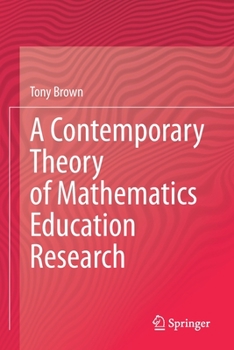A Contemporary Theory of Mathematics Education Research
Select Format
Select Condition 
Book Overview
This book by-passes both psychology and sociology to present an original social theory centered on seeing mathematical learning by everyone as an intrinsic dimension of how mathematics develops as a field in support of human activity. Here, mathematics is defined by how we collectively talk about it. Drawing on psychoanalytic theory, the student is seen as participating in the renewal of mathematics through their contributions to our collective gaze on mathematics as the field responds to ever new demands. As such learning takes a critical stance on the standard initiations into current practices often promoted by formal education.
In the field of mathematics education, researchers have moved from psychology where individual students were seen as following natural paths of development through existing mathematical knowledge, to socio-cultural models predicated on students being initiated into the human world and understood through the reflective gazes this world hasof itself, such as those found in comparisons of student learning in different countries. This book addresses the domain, purpose and functioning of contemporary research in mathematics education and is an original contribution to this theme.
The book is aimed at a mathematics education research audience. It continues a dialogue with existing publications, seen widely as a cutting edge and will also be of interest to students and practitioners in the fields of qualitative research, social theory and psychology.
In the field of mathematics education, researchers have moved from psychology where individual students were seen as following natural paths of development through existing mathematical knowledge, to socio-cultural models predicated on students being initiated into the human world and understood through the reflective gazes this world hasof itself, such as those found in comparisons of student learning in different countries. This book addresses the domain, purpose and functioning of contemporary research in mathematics education and is an original contribution to this theme.
The book is aimed at a mathematics education research audience. It continues a dialogue with existing publications, seen widely as a cutting edge and will also be of interest to students and practitioners in the fields of qualitative research, social theory and psychology.
Format:Paperback
Language:English
ISBN:3030551024
ISBN13:9783030551025
Release Date:October 2021
Publisher:Springer
Length:151 Pages
Weight:0.56 lbs.
Dimensions:0.4" x 6.1" x 9.2"
Customer Reviews
0 rating





